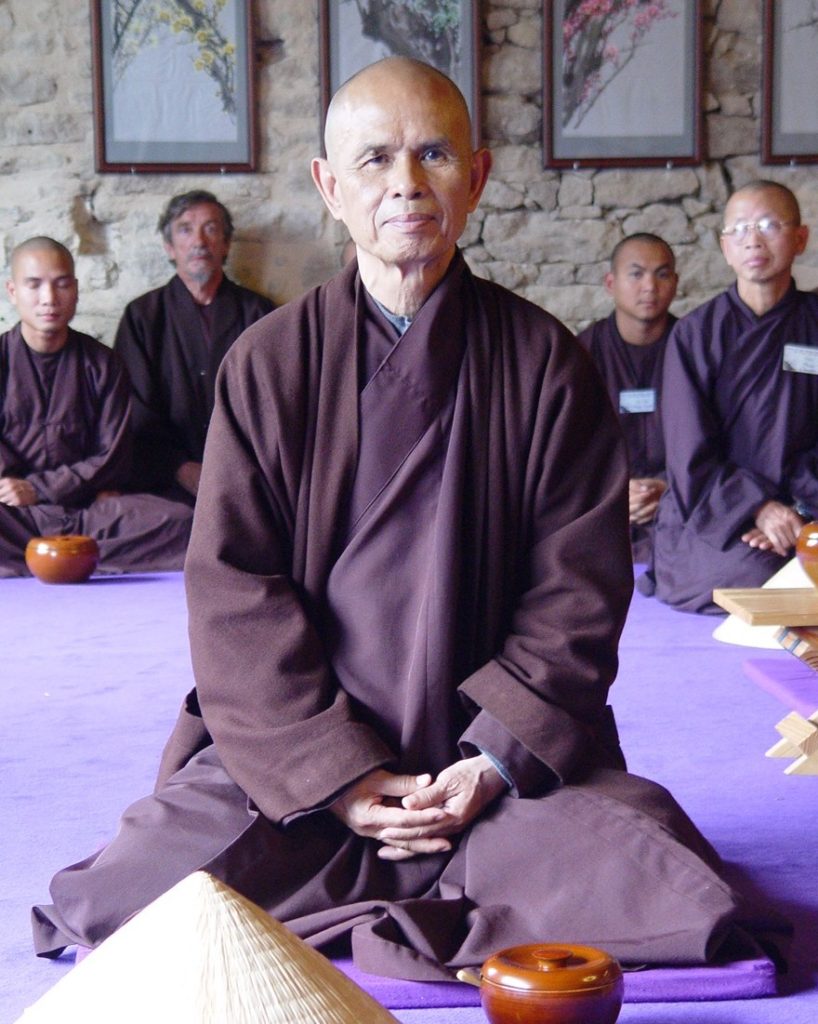
Cahaba River Sangha
What to Expect at Our Sangha Meetings
Who Attends Our Sangha?
Our meditation community is open to all people regardless of their race, religion, gender, sexual orientation, or belief system.
Our meeting details will be announced here on our website, our social media, and by email.
Our Sangha Practices in the Plum Village Tradition
of Zen Master Thich Nhat Hanh
Cultivation of Diversity
Our sangha seeks to cultivate the deep and rich diversity, in all aspects, that is found in our community. We aspire to make all people who seek to practice feel welcome and supported and to help them succeed on their path of practice. We seek to take actions to eliminate barriers, whether they are physical, economic, cultural, or attitudinal to the practice. As sangha members we all seek to diversify our relationships, commit to open-mindedness toward other points of view, examine our own beliefs and actions, and increase the compassion in how we live our lives and understand each other.
A Guide to Attending Our Sangha Meeting
We invite everyone to arrive 10-15 minutes early at our meeting space or by logging to the Zoom so that we can greet each other, answer questions, and approach our time with mindfulness and without hurry. This way, we all participate in the creation of our Sacred Practice Space.
Find a place in our room or your home where you will not be disturbed and turn your phone off or place it in silent mode. Sit comfortably on a mat, cushion, bench or chair. We encourage you to take your shoes off to enhance your points of connection to use in your meditation practice.
- If on Zoom, mute your microphone so as not to disturb others
- Identify 3 points of contact, ie. your feet on the floor, your bottom on your cushion, your hands together
- Take a few deep breaths following your breath from the beginning of the inhale through the finish of the exhale.
A sangha gathering is not a time to suffer, so comfort is important. We are all encouraged to take responsibility for our own well-being and adjust your posture to suit your comfort level. Some may choose to sit or stand or lay down (but don’t fall asleep).
During the mindfulness teaching and sharing, we practice loving speech and deep listening. It is a special time for us to share our experiences, our joys, our difficulties and our questions relating to the practice of mindfulness. By learning to speak out about our happiness and our difficulties, we contribute to the collective insight and understanding of the sangha.
We do not engage in theoretical or abstract conversations about theories or texts but rather, we will only speak directly from our own experiences. We will refrain from characterizing the experiences of others, giving unsolicited advice, or inserting ourselves into their stories. By avoiding such “cross-talk,” we honor and safeguard each individual’s sharing. We will remember not to spread news that we do not know to be certain and not to criticize or condemn things of which we are not sure. We will refrain from uttering words that can cause division or discord.
By practicing deep listening while others are speaking, we help create a calm and receptive environment. Mindful of our own inner dialog, if we refrain from agreeing, disagreeing or wanting to respond, we can choose to come back to being present with the person speaking. By being witness to sangha members, we support healing, joy, and spiritual growth of the individual and ourselves.
Whatever is shared during sharing time is confidential. If a friend shares about a difficulty he or she is facing, we will respect that he or she may or may not wish to talk about this individually outside of the sangha discussion time.
The meeting will end with a calling of the mindfulness bell inviting us to take three deep breaths together. Afterwards another bell we will bow to the group and end the meeting
All are welcome to stay in the room or on Zoom for questions, casual conversation and community.
Hi, I’m Chris and have lived in Birmingham since 1985. I have been meditating off and on since I was a teenager and committed to a daily practice in 2016. After visiting the Magnolia Grove Meditation and Practice Center in Batesville, MS, (part of the Plum Village Community), I decided to start a meditation group in Birmingham. I desire to practice mindfulness meditation with a diverse group of people of all ages, genders, ethnicities, faiths, sexual orientations, and backgrounds. It would be an honor to have you join us in our group practice.
If you have any questions, you can reach me HERE.
Thich Nhat Hahn
One of the best known and most respected Zen masters in the world today, poet, and peace and human rights activist, Thich Nhat Hanh (called Thây by his students) has led an extraordinary life. Born in central Vietnam in 1926 he joined the monkshood at the age of sixteen. The Vietnam War confronted the monasteries with the question of whether to adhere to the contemplative life and remain meditating in the monasteries, or to help the villagers suffering under bombings and other devastation of the war. Nhat Hanh was one of those who chose to do both, helping to found the “engaged Buddhism” movement. His life has since been dedicated to the work of inner transformation for the benefit of individuals and society.
In Saigon in the early 60s, Thich Nhat Hanh founded the School of Youth Social Service, a grass-roots relief organization that rebuilt bombed villages, set up schools and medical centers, resettled homeless families, and organized agricultural cooperatives. Rallying some 10,000 student volunteers, the SYSS based its work on the Buddhist principles of non-violence and compassionate action. Despite government denunciation of his activity, Nhat Hanh also founded a Buddhist University, a publishing house, and an influential peace activist magazine in Vietnam.
After visiting the U.S. and Europe in 1966 on a peace mission, he was banned from returning to Vietnam in 1966. On subsequent travels to the U.S., he made the case for peace to federal and Pentagon officials including Robert McNamara. He may have changed the course of U.S. history when he persuaded Martin Luther King, Jr. to oppose the Vietnam War publicly, and so helped to galvanize the peace movement. The following year, King nominated him for the Nobel Peace Prize. Subsequently, Nhat Hanh led the Buddhist delegation to the Paris Peace Talks.
In 1982 he founded Plum Village, a Buddhist community in exile in France, where he continues his work to alleviate suffering of refugees, boat people, political prisoners, and hungry families in Vietnam and throughout the Third World. He has also received recognition for his work with Vietnam veterans, meditation retreats, and his prolific writings on meditation, mindfulness, and peace. He has published some 85 titles of accessible poems, prose, and prayers, with more than 40 in English, including the best selling Call Me by My True Names, Peace Is Every Step, Being Peace, Touching Peace, Living Buddha Living Christ, Teachings on Love,The Path of Emancipation, and Anger. In September 2001, just a few days after the suicide terrorist attacks on the World Trade Center, he addressed the issues of non-violence and forgiveness in a memorable speech at Riverside Church in New York City. In September of 2003 he addressed members of the US Congress, leading them through a two-day retreat.
Thich Nhat Hanh continues to live in Plum Village in the meditation community he founded, where he teaches, writes, and gardens; and he leads retreats worldwide on “the art of mindful living.”
Teachings
Thich Nhat Hanh’s key teaching is that, through mindfulness, we can learn to live in the present moment instead of in the past and in the future. Dwelling in the present moment is, according to Nhat Hanh, the only way to truly develop peace, both in one’s self and in the world.

